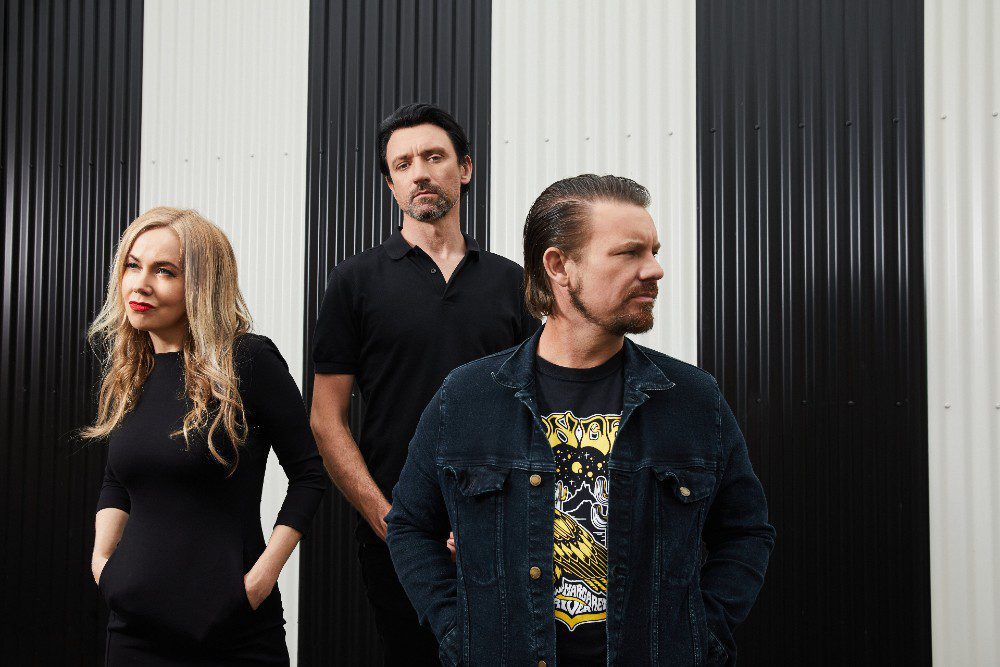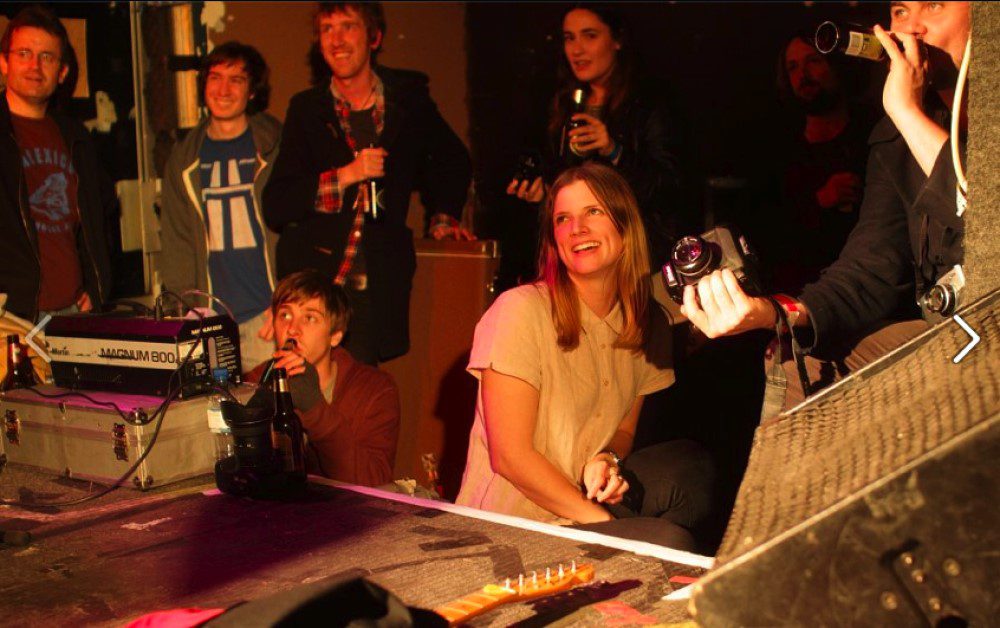Something For Kate Bassist Stephanie Ashworth Talks New LP, The Modern Medieval


Something For Kate is, like black coffee and rooftop beer gardens, fundamentally part of Melbourne. The trio – guitarist/keyboardist/vocalist Paul Dempsey, drummer Clint Hyndman and bassist Stephanie Ashworth – have been performing and releasing albums since the mid-1990s. Their latest album, The Modern Medieval, arrives after an eight year hiatus to defy modern rock’s subgenre classifications, though Ashworth agrees that the band is a quintessentially Melbourne creation.
“Something For Kate has always been that way,” she says. “We’d been living overseas prior to this but we’ve always come back to Melbourne. Paul met Clint here, and formed the band here.” Dempsey and Ashworth, married with two children, have lived between Melbourne and New York for the past decade. “We moved to New York before we had kids,” she shares. “We had our first child when in New York, where half my family is from. We’d been there touring, recording and it got to the point where we just thought we should move there, so we did. Eventually, we came back to Melbourne and now we’re back and forth. We came back from Los Angeles just before COVID-19, fortunately.”
Hyndman remained in Australia, and though the distance – or even being the odd one out in a band with a married couple – might’ve broken up less tenacious bands, Ashworth assures me that the drummer is like family.
“Clint is Paul’s best friend and he’s like my brother. I talk to Clint probably more than I talk to Paul! Clint loves to chat, he loves a gossip, he’s really fun. It’s the perfect combination for a three-piece: a married couple and we’re best friends between us,” she says. “The three of us have a reputation for being a very, dark, serious band, thanks to a magazine article back in 1997, but we laugh a lot. The three of us have an absolute blast; we’re sillier than anyone would ever expect. When Paul and I moved to New York, we didn’t see Clint for eight months and yet when he walks into the room, we all laugh at the same thing. The two of them are my world and I don’t go a day without talking to either of them.”
Though they haven’t released music as Something For Kate since 2012’s Leave Your Soul To Science, the band has been busy with other pursuits. Dempsey spent late 2017 and early 2018 touring his sophomore solo album Strange Loop internationally, as well as touring Europe with David Bowie’s band in Celebrating David Bowie. In 2018, Dempsey, Ashworth, and Hyndman set aside any outside interests and committed to the writing of The Modern Medieval, their seventh album.
“The boys in the band know when I’m right into a particular song. I’m insufferable, banging on about it!” Ashworth says, noting that she’s not coy about picking favourites. “The closing song, ‘I Will Defeat You,’ is my favourite on the record. For us, it’s quite playful. We don’t often take another genre and decide to bend it, but we did with that. It’s our version of a soul, blues song. I love the fact that the subject matter of the song is so dark, but it has this almost ZZ Top bassline. I find it hard to restrain myself and play bass so minimally, but I loved doing it for that song.”
The demands of writing an album and spending 24/7 together might break some couples, or some individuals, but Ashworth gives no sense that this has been, or could be, a challenge for her marriage. “Any couple that work together are going to bring their work home,” she says. “We might have inappropriate conversations at 3am, fiery moments with business decisions and writing songs, but there’s always a level of respect that is very strong.”
Ashworth was the last member to formally join Something For Kate, replacing touring bassist Toby Ralph, who in turn had replaced original bassist Julian Carroll, after the recording of the band’s 1997 debut LP, Elsewhere for 8 Minutes. “I still have my perspective of [Paul] as a songwriter and [Something For Kate] as a band before I came along… I have an enormous respect for Paul as a musician, and I’ve never taken that for granted,” Ashworth says. “I’ve not worked with many musicians who can do what he does – he has perfect pitch, which is freakish. When I first met him, he did an eight-minute drum track, put the bass track down, the guitar track down on his solo album and watched the engineers go ‘holy crap.’ If he hears a piece of music, he can play it back to you within a minute. When you play with someone like that, it’s really intimidating because you know – I’m a very punk rock bass player compared to him.”
Much like The Slits’ Viv Albertine – who told NPR last year that without role models, there was little option other than to be self-taught, which led to more intuitive and authentic playing – Ashworth believes the lack of formal training has been an asset, one that Dempsey, too, recognised as valuable. “Paul pursued me as a bass player because he said I approach the melody in a way he hadn’t heard before. He appreciated that I haven’t had the creativity beaten out of me by a rule book,” she remembers.
Ashworth’s love affair with music began aged 10, with her ear pressed up to her brother’s bedroom door as he played 7-inch records from The Clash, The Cure, The Smiths, and Siouxsie and The Banshees. “As a 10 year-old it was intriguing to me and I was like, ‘what is that? I need to know more!’ So, I started buying 7-inches and staying up late to watch Rock Arena, buying English music magazines like Melody Maker and learning about all of these bands,” she says. “I bought keyboards and messed around with them in my bedroom, then I started sneaking into punk rock gigs in Perth as a teenager. When I moved into a sharehouse in Melbourne, aged around 19, I ended up teaching myself bass guitar because someone I knew needed a bassist at short notice.”
Ashworth has not played the game other bands of the 1990s and early 2000s have – their female members appearing in fashion and lifestyle magazines to answer questions about their skincare regime, favourite fashion labels and hairstyle tips in an effort to hopefully draw attention back to their music. “Throughout the past two decades, I was often asked to be in an article on women in music. The reason I turned those articles down was I felt like I was being treated like a novelty. Even if it was women putting these articles together for mainstream media, it felt like, ‘How cute, you’re in a band and you’re a girl!’ I felt like it was tokenistic – the whole tone of the articles would be titillating, voyeuristic, focused on women’s clothing choices,” Ashworth says. “I told my record company I wasn’t going to perpetuate the idea that I’m a novelty, a minority, and what I do is a novelty act. It’s only been the last couple of years that I’ve started talking to people about why, and I’ve seen things change. There’s a lot of women in bands now; for a long time, I felt like I was out there on my own.”
“Misogyny has been an issue,” Ashworth adds. “I definitely experienced this patronising attitude from older men, particularly when supporting international bands. Their roadies and crew would give this vibe. I didn’t acknowledge it and got on with what I was doing. Until more women are in positions of power, and there’s much more discussion than there was, there’s a lot of tokenism still happening.” She says Something For Kate have made a point of employing women as booking agents and managers, but that there’s still room for improvement in the industry. “I’d like to see more female crew – that’s an area that needs work. In America, there’s all-female crews but Australia is yet to get there. Those jobs need to get offered to women in the first place so that they can get the experience,” she says. “I’ve seen women who are incredible at their jobs, really intelligent and deserving of promotion, just get passed over for the big boys’ club. We’ve always tried to subvert that, where we can.”
Much of the press in Australia has presumptuously reported that the band had broken up, or been on holidays for the past eight years, labelling The Modern Medieval a “comeback album.” Ashworth is bemused.
“We never broke up. We don’t think of this as a ‘comeback record’ – we’ve been touring the whole time, we’ve done festivals the whole time,” she states. “Paul went over to Chicago, made a record, and toured that for two years. When I had a child, we couldn’t tour for a while. When Bowie died, his band asked Paul to sing, so we had to wait until the touring with them eased, so that we could work on the album. We had to lock Paul down – that’s why it took eight years. Children, world touring, and Bowie.”
Follow Something For Kate on Facebook for ongoing updates.




